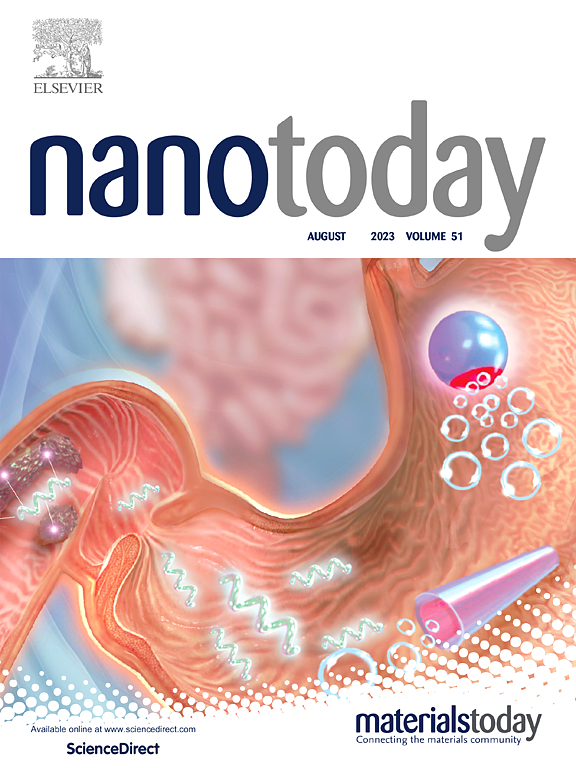通过逆转肿瘤免疫抑制微环境提高 mRNA 肿瘤疫苗疗效的多功能脂质纳米制剂
IF 10.9
1区 材料科学
Q1 CHEMISTRY, MULTIDISCIPLINARY
引用次数: 0
摘要
单纯依靠免疫杀伤效应的mRNA肿瘤疫苗不足以实现有效的肿瘤抑制,主要是因为肿瘤免疫抑制微环境(tumor immunosuppressive microenvironment, TIME)显著阻碍了细胞毒性T淋巴细胞的功能。为了提高mRNA疫苗的效力,我们开发了一种肿瘤靶向纳米制剂,共载cpt衍生的SN38前药和siPD-L1 (RSLNP/siPD-L1),与mRNA疫苗共给药。低剂量SN38不仅能抑制肿瘤细胞的增殖,还能诱导免疫原性细胞死亡,与sipd - l1介导的免疫检查点阻断联合可逆转TIME。抗肿瘤研究表明,RSLNP/siPD-L1使mRNA疫苗对黑色素瘤小鼠的肿瘤抑制率提高了47.7% %,对乳腺癌小鼠的肿瘤抑制率提高了26.1% %。免疫分析表明,RSLNP/siPD-L1不仅促进了局部抗原提呈细胞的成熟和免疫因子的分泌,而且增强了肿瘤微环境中细胞毒性淋巴细胞的浸润、活化和杀伤作用,使“冷肿瘤”转变为“热肿瘤”。所构建的RSLNP/siPD-L1显著提高了mRNA疫苗的抗肿瘤效果,为临床肿瘤治疗提供了新的策略。本文章由计算机程序翻译,如有差异,请以英文原文为准。
Multi-functional lipid nanoformulations for enhancing the efficacy of mRNA tumor vaccines by reversing tumor immunosuppressive microenvironment
mRNA tumor vaccines relying solely on the immune killing effect are inadequate for achieving efficient tumor suppression, primarily because tumor immunosuppressive microenvironment (TIME) significantly impedes the function of Cytotoxic T lymphocytes. To enhance the efficacy of mRNA vaccines, we developed a tumor-targeted nanoformulation co-loaded with a CPT-derived SN38 prodrug and siPD-L1 (RSLNP/siPD-L1) for co-administration with mRNA vaccines. Low-dose SN38 not only inhibits the proliferation of tumor cells but also induces immunogenic cell death, which, in combination with siPD-L1-mediated immune checkpoint blockade can jointly reverse TIME. Antitumor studies showed that RSLNP/siPD-L1 increased the tumor inhibition rate of mRNA vaccines by 47.7 % in melanoma-bearing mice and by 26.1 % in breast cancer-bearing mice. Immune analysis indicated that RSLNP/siPD-L1 not only promoted the maturation of local antigen-presenting cells as well as the secretion of immune factors, but also enhanced the infiltration, activation, and killing effects of cytotoxic lymphocytes in the tumor microenvironment, transforming “cold tumors” into “hot tumors”. The developed RSLNP/siPD-L1 significantly enhances the antitumor efficacy of mRNA vaccines and provides a new strategy for clinical cancer treatment.
求助全文
通过发布文献求助,成功后即可免费获取论文全文。
去求助
来源期刊

Nano Today
工程技术-材料科学:综合
CiteScore
21.50
自引率
3.40%
发文量
305
审稿时长
40 days
期刊介绍:
Nano Today is a journal dedicated to publishing influential and innovative work in the field of nanoscience and technology. It covers a wide range of subject areas including biomaterials, materials chemistry, materials science, chemistry, bioengineering, biochemistry, genetics and molecular biology, engineering, and nanotechnology. The journal considers articles that inform readers about the latest research, breakthroughs, and topical issues in these fields. It provides comprehensive coverage through a mixture of peer-reviewed articles, research news, and information on key developments. Nano Today is abstracted and indexed in Science Citation Index, Ei Compendex, Embase, Scopus, and INSPEC.
 求助内容:
求助内容: 应助结果提醒方式:
应助结果提醒方式:


